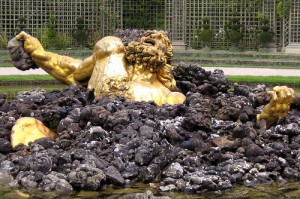Enceladus strikes again Posted by Ourania on Feb 5, 2014 in Uncategorized, Vocabulary
The last few days everyone in Greece talks about the earthquake that striked Cephalonia twice in a week. According to scientists, earthquakes happen because two blocks of the earth slip past one another. Many years ago, the ancient Greeks gave their own interpreting which is far more poetic and scary.
The story goes that in the Antiquity there was an epic battle between the Olympian gods and the Giants. It’s the eternal fight between Good and Evil. The battle is known as Γιγαντομαχία (Gigantomahia, Gigantomachy ) and was narrated by Ησίοδος (Isiodos, Hesiod). Εγκέλαδος (Encelados, Enceladus), sun of Γαία (Gaia, earth) was one of the giants who attacked the gods and was wounded. There are many versions of this story and the most popular is that he was killed by godess Αθηνά (Athena) and was buried under Mount Etna in Sicily. His breath and sigh are the causes of volcanic eruptions and earthquakes. One of Enceladus’ brothers was Τυφών (Tifon, Typhon).
Greece has always been hit by earthquakes and as people did not have the knowledge to explain this phenomenon, they related it to a mythical creature. I have experienced the effects of a strong earthquake twice in my life and I know that myths have nothing to do with reality. However, every time I see videos and photos of people crying for the loss of their loved ones and for the damage of their property, I keep thinking that myths were created for a reason and that every myth contains a dose of truth.
Vocabulary
1. Εγκέλαδος (Engelados): Enceladus
Ο Εγκέλαδος χτύπησε το νησί για δεύτερη φορά.
O Engelados htipise to nisi gia defteri fora.
Enceladus hit the island for the second time.
2. Ο σεισμός (o sismos): the earthquake
Το σπίτι τους καταστράφηκε από το σεισμό.
To spiti tous katastrafike apo to sismo.
Their house was damaged by the earthquake.
3. Σεισμόπληκτος, σεισμόπληκτη, σεισμόπληκτο (sismopliktos, sismoplikti, sismoplikto): a person or area hit by an earthquake
Η Κεφαλονιά κηρύσσεται σεισμόπληκτη περιοχή.
I Kefalonia kirisete sismoplikti periohi.
Cephalonia is declared an earthquake stricken area.
4. Σεισμολόγος (sismologos, seismologist)
Οι σεισμολόγοι προειδοποίησαν για την πιθανότητα μετασεισμών.
I sismologi proidopiisan gia tin pitahnotita metasismon.
Seismologists warned of the possibility of aftershocks.
5. ΚλίμακαΡίχτερ (klimaka Richter): Richter scale
Σεισμός μεγέθους 6 βαθμών της κλίμακας Ρίχτερ σημειώθηκε στην Ινδονησία.
Sismos megethous exi vathmon tis klimakas Richter simiothike stin Indonisia.
An earthquake measuring 6 degrees of the Richter scale occurred in Indonesia.
Sources:
http://earthquake.usgs.gov/learn/kids/eqscience.php
http://proteus.brown.edu/greekpast/4816

Build vocabulary, practice pronunciation, and more with Transparent Language Online. Available anytime, anywhere, on any device.
About the Author: Ourania
Ourania lives in Athens. She holds a degree in French Literature and a Master’s degree in Special Education for Children. Since 2008, she has been teaching Greek to foreigners.




